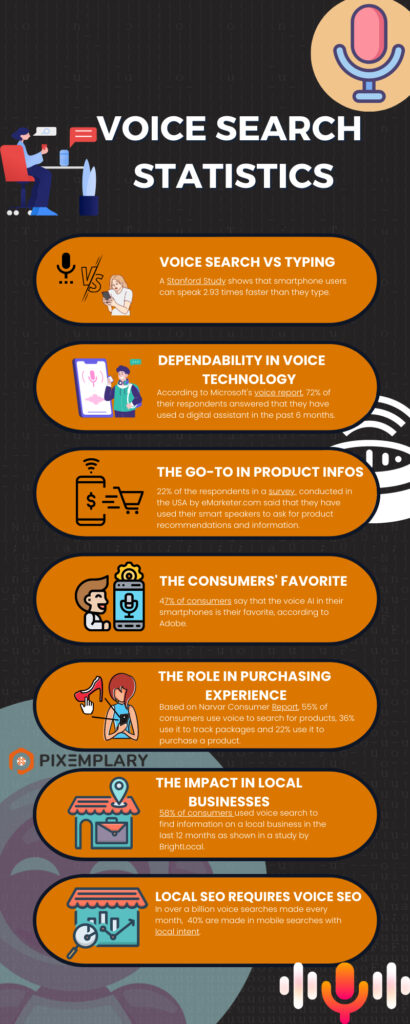Voice Search has transformed the way people search and shop on the internet for the past decade. The question is, is it here to stay?
We’ve already said goodbye to 2022 and 2023 gives us a lot of chances to take our business game plan to a higher spectrum. Suppose you’re a business owner looking for effective marketing strategies, then Voice Search Optimization must be on your list.
Voice Search Usage is undeniably growing
The use of connected gadgets such as smartphones, smart speakers, wearables, smart TVs, and other home appliances is growing. The degree of convenience they supply to the consumer nowadays is their most desirable feature.
There is no doubt that gaining instant results just by pressing a button and speaking a phrase indeed made our lives easier.
In fact, Speech Recognition Technology is a game changer in the digital world that makes searching and shopping online effortless.
Thus, investing in voice search optimization is a vital step any business owner should take this 2023.
Why?
Because it’s a great way to get more customers and increase your sales.
What is voice search?
Voice Search is a revolutionary technology that allows users to search the internet hands-free. This means that users can perform searches simply by speaking into their devices. Voice search is powered by artificial intelligence (AI), and it’s constantly getting more accurate and sophisticated.
How does voice search work?
The voice search function works using Automatic Speech Recognition Software (ASR) to convert speech signals into text. The search engine then uses the translated text as a standard query and produces relevant results.
So how does speech recognition work?
By using technology to assess voice biometrics.
This includes the frequency, flow, and intonation of your voice. Each word you say is divided into fragments of different tones. This is digitized and catalyzed to create a unique voice model.
To understand how this works in practice, let’s take a look at an example. Let’s say you wanted to learn about voice search history.
You could ask your smart speaker: “Alexa, tell me about the history of voice search?”
The Alexa Voice Service would then convert your spoken words into text and send it off to Amazon Web Services (AWS). AWS would process your request and provide you with an answer from one of its many databases.
In this case, it might pull up a Wikipedia page on voice search and read out some key information for you.
Machine Learning and Artificial Intelligence
Another example is Google’s Rankbrain – built to discern words and phrases to learn and predict better results.
So when you ask something RankBrain has never encountered before, it will make the best “guess” in context with your intent and meaning, and then give the most applicable answers.
This advancement in machine learning and Artificial Intelligence like RankBrain makes voice search more effective even at handling unexpected questions.

What is Voice Search Optimization?
Voice Search Optimization is the process of organizing keywords and/or phrases, streamlining and upgrading this information on your website pages to appear in voice searches.
Search Engine Optimization or SEO is a vital aspect for all businesses to increase their brand reach and gain more visibility by ranking on top of search engine results.
Needless to say, voice search optimization can improve your business by helping to increase conversion rates, reduce bounce rates and improve overall user experience.
The Benefits of Voice Search Optimization in Your Business
Voice Search is one of the hottest trends in SEO right now, and for good reason. Voice Search Optimization can have a major impact on your business.
Here are just a few of the many reasons why you should consider implementing voice search optimization in your industry.
- Improved Rankings. One of the biggest advantages of voice search optimization is that it can help improve your rankings in search engines like Google. This is because Google uses machine learning algorithms to understand the content on your site and determine how relevant it is to the user’s queries. By optimizing your site for voice search, you can help Google understand what content is most important and make sure that it ranks you accordingly.
- Increased Traffic. Another benefit of voice search optimization is that it can help increase traffic to your site. This is because when users perform a voice search on Google or another engine, they will be presented with results that are optimized for this type of search. So if your site appears at the top of these results, more people will be likely to click on it and visit your site.
- Better Conversion Rates. Voice search optimization can help improve your conversion rates by making it easier for users to find what they’re looking for on your site. With traditional text-based searches, users often have to wade through a lot of content before they can find what they’re looking for. With voice searches, however, users can simply ask their device what they’re looking for and have it direct them straight to the relevant page on your site. This makes it much easier for users to find what they’re looking for and convert to whatever it is that you’re offering them.
- Reach more customers. With more and more people using voice assistants like Siri and Alexa, you can reach a whole new audience by optimizing your site for voice search.
- Drive more sales. Studies have shown that people who use voice assistants are more likely to make purchases than those who don’t. So if you want to boost your sales, voice SEO is a great way to do it.
- Stand Out from the Competition. Not many businesses are doing voice search optimization yet, which means you’ll have a leg up on the competition if you start now.
- Get ahead of the trends. Voice search is only going to become more prevalent in the years to come, so by optimizing your site now, you’ll be ahead of the curve.

The Up-And-Coming Voice Search Trends in 2023
As we continue to move into a more digital world, voice search is becoming more and more popular. According to Google, twenty-seven percent (27%) of the global online population is using voice search using their mobile phones. This shows the shift in how people search for information online, and this trend is going to continue to grow in the coming years.
In 2023, we expect to see some major changes and trends in the world of speech recognition technology. Here are some important predictions to note from industry experts:
- Greater integration with smart devices and homes. In 2023, we can expect a more significant integration between voice assistants and smart devices like thermostats, lights, and door locks. This trend will make it even easier for people to control their homes. We’ll see more homes equipped with Voice-First hubs like Amazon Echo and Google Home as the technology becomes mainstream.
- Increased accurate results. As voice search technology continues to evolve, we can expect to see more accurate results. Voice recognition is going better each time and it is only going to improve. With this, people are able to rely on voice search more and more likely to get what they’re looking for.
- More natural language processing. Another trend we’ll see in 2023 is more natural language processing. This indicates that voice assistants will be able to understand the nuances of human conversation better than ever before.
- Personalized Results. Just as search engines have begun to personalize results based on a user’s location and past searches, they will also start to tailor results based on a user’s voice. This could include taking into account the user’s accent, dialect, and even emotional state.
- More use of voice assistance for tasks. People will increasingly use voice assistants for tasks beyond just searching the web or playing music. This could include things like ordering food, booking travel, and sending more personalized messages.
- Increased usage coverage in business and enterprise settings. Until now, voice recognition technology has mostly been used in consumer settings, but in 2023, we’ll see it being used progressively in business and enterprise settings. This could include things like customer service hotlines, employee productivity tracking, and even sales enablement tools.
How do you optimize your business website for voice search?
Voice search presents a unique opportunity for businesses to stand out. Because so few companies are optimizing for voice search, those that do will have a clear advantage.
If you’re not sure where to start, here are some tips to help you with:
- Create high-quality content. The first step in optimizing your business for voice search is creating high-quality content. This means that your website content needs to be clear and easy to understand. If not or if it contains errors, Google may not show it in the top results of certain searches.
- Use natural language. When people use voice, they tend to use more conversational language than when they type out a query. Google reports that nearly 70 percent (70%) of requests made to Google Assistant were done by using conversational language. So make sure that your content reflects that by using natural language yourself
- Optimize for long-tail keywords. Since people tend to speak in full sentences when they use voice in searching, long-tail keywords are more important than ever. Include them in your title tags, meta descriptions, and throughout your content to make sure you’re being found for the right queries.
- Structure your content with questions in mind. Voice search is driven by questions, so it’s vital to structure your content around them. Use FAQs, How-Tos, and other question-based formats to make certain your content is ready for voice searchers.
- Make sure your website is mobile-friendly. Since most voice searches happen using mobile devices (smartphones or tablets), it is very important not to skip this part. If your page takes too long to load or respond, is difficult to navigate, and looks messy in the mobile version, Google may not show it in the top results. To see if your website is mobile-friendly, you may run a site speed check here and then enter your website URL in Google’s Mobile-Friendly Test.
- Get listed in directories. When people use voice in searching to find local businesses, they often turn to directory listings such as Yelp or Google My Business. Make sure your business is listed in these directories so you can take advantage of this traffic source. If you have multiple locations, then, be sure to optimize each listing with unique content so searchers can easily find the location nearest them.
- Use schema markup. Schema Markup is a type of code that assists search engines in understanding the content of your website. By adding this, you are making it easier for search engines and voice assistants alike to find and understand your content-which can only help improve your ranking.
- Promote your business. Finally, you’ll need to promote your business in order for it to be successful on voice search. This means creating and distributing content through channels like social media and email marketing campaigns. By promoting your business properly, you can help increase awareness of your brand and drive new customers to your site.
Implementing these tips can help you take advantage of the growing trends of voice search – and set yourself up for future success.
Conclusion:
It is clear that voice search is becoming more popular and will continue to do so in the coming years. Businesses need to be aware of this trend and adapt their marketing strategies accordingly. This means creating content that is optimized for speech recognition and ensuring your website is easily navigated by voice assistants.
So if you want to take this opportunity for your business but don’t know where to start, Pixemplary Digital Marketing Agency Philippines can definitely help you.
Remember, if you don’t stay ahead of the curve, you risk being left behind by your competitors. Act now.






